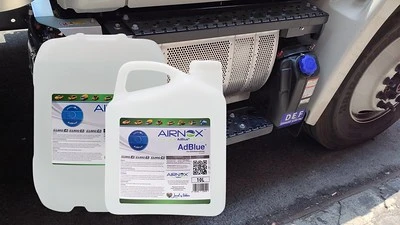
Diesel Exhaust Fluid (DEF) plays a crucial role in the world of modern diesel engines, ensuring they operate more cleanly and efficiently. But as you traverse the globe, you might encounter different names for this pivotal solution. What’s behind these varied names, and why is there more than one term for this liquid? In this article, we’ll delve into the alternate names for DEF and understand their significance.
- Aqueous Urea Solution 32%, often called AUS 32, is just another name for Diesel Exhaust Fluid. It’s a liquid mixture made mostly of water and about 32% urea. This solution helps reduce harmful emissions from diesel engines
- Adblue is another name often used for Diesel Exhaust Fluid or DEF. Both Adblue and DEF are liquids that help diesel engines produce cleaner emissions. They contain water and urea, with the main purpose of breaking down harmful pollutants from the exhaust.
Read also: What is the Best Diesel Exhaust Fluid?
Naming Depends on the Region
The naming for Diesel Exhaust Fluid (DEF) does vary based on the region or country. Here’s a simple explanation:
- North America: In the United States and Canada, the term “Diesel Exhaust Fluid” or “DEF” is most commonly used.
- Europe: In many European countries, the solution is popularly known as “Adblue.”
- AUS 32: This stands for “Aqueous Urea Solution 32%.” It’s a technical term that can be recognized internationally, describing the solution based on its composition.
Different regions might have specific branding or naming conventions for the same product due to cultural preferences, translation differences, or marketing strategies. However, regardless of the name, the purpose and composition remain consistent: a solution made mainly of water and urea to reduce harmful emissions from diesel engines.
The Name Doesn’t Equate to Brand Quality
A name or term used to describe a product, like Diesel Exhaust Fluid (DEF), doesn’t necessarily speak to the quality of a specific brand’s product. Here’s a simple conclusion that touches upon that idea:
In discussing ‘What is Another Name for Diesel Exhaust Fluid?’, it’s essential to remember that while terms like ‘AdBlue’ or ‘AUS 32’ might be used interchangeably in different regions, the name doesn’t necessarily equate to brand quality. Various manufacturers produce these solutions, and the quality can vary.
It’s always a good idea for consumers to research and choose reputable brands, ensuring that they’re getting a high-quality product for their vehicles. A name might be universally recognized, but the effectiveness and purity of the product come down to the manufacturer’s standards.
While terms like ‘AdBlue’ or ‘AUS 32‘ are essentially descriptors of the solution’s function and composition, the quality of the product often lies in the details. For instance, impurities in the solution or variations in the urea concentration can affect its effectiveness and the overall health of the diesel engine’s emission system.
Consistent quality ensures not only compliance with environmental regulations but also prevents potential damage to the vehicle’s Selective Catalytic Reduction (SCR) system. Subpar or contaminated DEF can lead to malfunctions, reduced efficiency, and increased maintenance costs over time.
In a marketplace with multiple brands offering Diesel Exhaust Fluid, it’s crucial for consumers to not just go by the name or price alone. Looking into brand reputation, customer reviews, and even certifications can provide insights into the product’s quality. Additionally, vehicle manufacturers might have specific recommendations or approved DEF brands, which can be a reliable guideline for consumers.
What Is DEF Used For?
Here’s a simple explanation for what Diesel Exhaust Fluid (DEF) is used for:
Diesel Exhaust Fluid, often called DEF, is used in many modern diesel vehicles to help them run cleaner. It’s added to a special system in the vehicle that sprays it into the exhaust. When DEF meets the hot exhaust, it starts a reaction that turns harmful pollutants into harmless water and nitrogen gas. So, by using DEF, diesel vehicles release fewer bad things into the air and are better for the environment.
Without DEF, diesel engines would release a lot more nitrogen oxides (NOx) into the air. NOx is not good for our health or the environment. It can cause smog, acid rain, and even respiratory problems in people.
But thanks to the introduction of DEF, many diesel vehicles now meet strict emission standards. When you see a truck or a bus on the road, there’s a good chance it’s using DEF to keep the air cleaner.
To make sure it works properly, drivers need to refill their DEF tanks regularly, just like how we fill up our cars with gasoline or diesel fuel. If a vehicle runs out of DEF, it might not run correctly or might limit its power to remind the driver to refill.
What is Its Composition
Adblue Composition:
- Water: About 67.5% of Adblue is distilled or deionized water. This acts as the carrier for the urea, allowing it to be sprayed into the exhaust stream.
- Urea: The other 32.5% is high-purity urea. Urea is a compound made from nitrogen and hydrogen. When it’s introduced into the hot exhaust, it breaks down and helps turn harmful nitrogen oxides into harmless nitrogen and water vapor.
So, in simple terms, Adblue is mostly water with a bit of urea mixed in to help clean up diesel emissions.
To Make a Conclusion
In wrapping up the topic of ‘What is Another Name for Diesel Exhaust Fluid?’, it’s clear that naming conventions can vary by region, with terms like ‘AdBlue’ and ‘AUS 32’ being commonly used in different parts of the world. Regardless of the name, the primary purpose remains consistent: to help diesel vehicles reduce harmful emissions. By understanding these names and their significance, users can better navigate the world of diesel engines and contribute to a cleaner environment.
